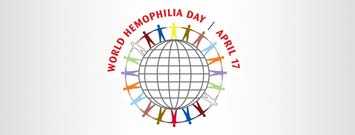Hemophilia World Day: Test Your Knowledge

World Hemophilia Day is April 17th. In the U.S. about 400 babies are born with hemophilia each year. How much do you know about hemophilia? Take our quiz to find out.
Hemophilia is an inherited bleeding disorder in which the blood does not clot properly. People with hemophilia can live full lives and enjoy most of the activities that other people do. If you have hemophilia, or know someone who does, it’s important to learn how to stay as healthy as possible.
World Hemophilia Day 2013 has special significance, as we mark 50 years of advancing treatment. For 50 years, the global bleeding disorders community has worked together to close the gap in care and to achieve treatment for all people, both men and women, with hemophilia and other inherited bleeding disorders, regardless of where they might live. However, much more remains to be done.
How much do you know about hemophilia?
CDC’s Work
Hemophilia Treatment Centers
CDC’s National Center on Birth Defects and Developmental Disabilities, along with other federal agencies, supports a network of comprehensive treatment centers able to meet the unique challenges of people with hemophilia and other bleeding disorders. Comprehensive treatment centers are specialized healthcare settings that bring together a team of doctors, nurses, and other health professionals experienced in treating people with rare or complex chronic medical conditions.
A CDC study of 3,000 people with hemophilia conducted in six U.S. states showed that those who received care in a hemophilia treatment center were 40% less likely to die of a hemophilia-related complication compared to those who did not receive care at a treatment center. Similarly, people who used a treatment center were 40% less likely to be hospitalized for bleeding complications.
Health Education and Outreach
Raising overall awareness about hemophilia is critical to advancing public health. To help achieve this, we support education and outreach activities for health promotion and wellness programs.
CDC currently collaborates with organizations such as the National Hemophilia Foundation and the Hemophilia Federation of America on education and outreach projects that promote wellness for people with hemophilia, such as the Steps for Living, FitFactor, and Blood Brotherhood Programs.
More Information
- Learn about World Hemophilia Day
- Hemophilia Information
- Video: Starting the Conversation – How to talk to your friends about hemophilia.
- Video: Playing it Safe – Friends with hemophilia talk about playing sports.
- CDC’s Division of Blood Disorders
- Page last reviewed: April 15, 2013
- Page last updated: April 15, 2013
- Content source:
- National Center on Birth Defects and Developmental Disabilities, Division of Blood Disorders
- Page maintained by: Office of the Associate Director for Communication, Digital Media Branch, Division of Public Affairs




 ShareCompartir
ShareCompartir